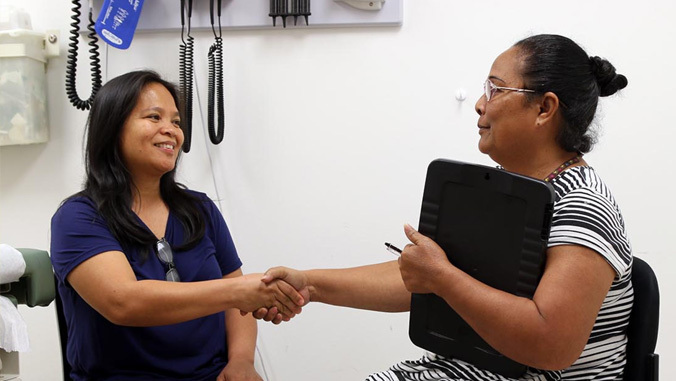
More than 150 attendees participated in a virtual event, Community Health Workers (CHWs): Exploring their Roles and Benefits in Health Settings, on October 26. The event highlighted the training programs at the University of HawaiʻiCommunity Colleges, in addition to the role that CHWs play in the community and the need for more employers and student practicum sites. The event was co-hosted by the UHealthy Hawaiʻi Initiative, Hawaiʻi Public Health Institute and Healthcare Association of Hawaiʻi.
UH has a grant to support training 100 CHWs over the 2020–21 academic year through the Hawaiʻi State Department of Health (DOH)-UH Contact Tracing Training Program. With 84 students currently in the pipeline, including 29 in a full-time fall 2020 cohort and 55 in a part-time year-long cohort, practicum sites and future employers for the CHWs are needed.
Impact of CHWs
The virtual event highlighted how employer panelists from The Queen’s Health Systems, Waianae Coast Comprehensive Health Center, Hawai‘i Pacific Health and DOH have employed CHWs and benefited by improving health care delivery, addressing social determinants of health, and realizing cost savings while improving patient outcomes. The event also featured practicing CHWs from West Hawaiʻi Community Health Center, The Queen’s Health System and Ke Ola Mamo.
“Our CHWs assist patients with applying to state and federal medical insurance programs,” shared Geldilyn Ebbay, supervisor for the Complex Care Program at Hawaiʻi Pacific Health, when discussing the role that CHWs play on their complex care teams. “[They] have allowed our nurses to focus on our patients’ medical needs, and together we’re able to prevent high Emergency Department utilization or readmission.”
Ashley Shearer, manager for Queen’s Care Coalition, The Queen’s Medical Center, said, “Our leadership saw the results and incredible outcomes our CHWs were having…by connecting patients to the right care in the community, our CHWs have driven down unnecessary ER visits by about 50 percent and driven down their total cost of care (paid for by Medicaid) by about 35 to 40 percent.”
The attendees included a mix of Hawaiʻi employers, educators, industry leaders, community leaders and CHWs. Attendees represented private clinics and hospitals, local and federal government, insurance companies, the pharmaceutical industry, telecommunications and education.
More on program, become an employer
The Community Health Worker training program is a 16-credit, five-course UH certificate program for candidates who have earned a high school diploma or GED. The program is offered online, statewide through Kapiʻolani Community College. Enroll in the CHW program or sign up to become an employer or practicum site for students at the CHW Program website or email oshi@hawaii.edu for more information.
A virtual informational session for employers about employing or hosting CHW students will be held November 4 at 12 p.m. If interested, please email oshi@hawaii.edu.

